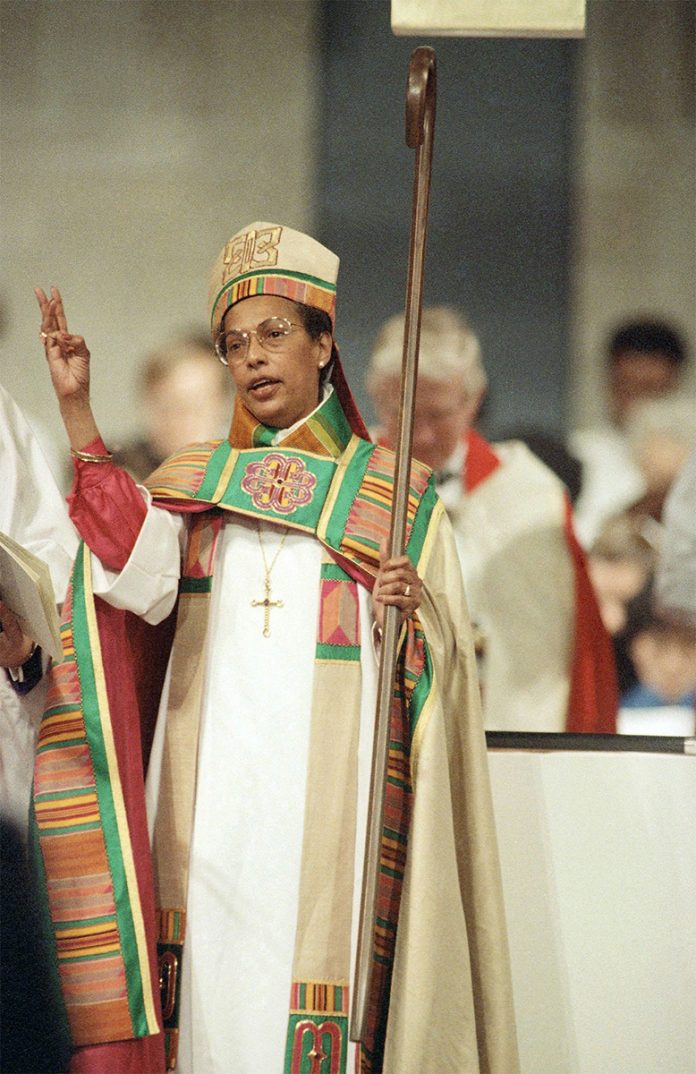The Rt. Rev. Barbara C. Harris broke ground throughout her life. A native Philadelphian, she spent her first 59 years living and working in the city. She died March 13 in hospice in Lincoln, Massachusetts, at age 89.
Harris leaves a rich legacy of activism that resonates through several — the Christian community, the Black community and the LGBTQ community. Harris said she ministered specifically to “the least and the lost and the left out.”
Harris was the first woman ordained as a bishop in the Episcopal Church of the United States. She was also the first woman in the entire worldwide Anglican Communion, the parent body of the Episcopal Church, an international family of 46 autonomous churches that includes the Church of England. She was ordained a bishop in Massachusetts in 1989 by Bishop Edmond L. Browning, Primate of the Episcopal Church of the United States.
Harris had been an acolyte at the ordination of the first 11 women Episcopal priests in 1974. Harris was ordained an Episcopal priest in Philadelphia by Bishop Lyman Ogilby at the historic Church of the Advocate in North Philadelphia in 1980. She served as chaplain to the Philadelphia County prisons. Prior to becoming bishop, Harris was named executive director of the Episcopal Church Publishing Company in 1984, and publisher of The Witness magazine.
Harris’ ordination as bishop caused a significant rift within the Episcopal church, which was still fighting the concept of women priests in many countries, including the U.S. At the time of her consecration as bishop, Harris was targeted by hate mail and even death threats.
Boston police offered her a bulletproof vest to wear for her consecration as bishop, but she refused. In a 2002 interview with the National Visionary Leadership Project, she dismissed the outrage over her ordination, noting, “Nobody can hate like Christians. The nasty letters I got were from church people, and you would not believe some of the things that they said in those letters — I laughed to keep from crying.”
From 1989 until her retirement in 2002, Harris served as suffragan, or assistant, bishop of the Massachusetts Episcopal diocese. Throughout her service as both priest and bishop, Harris championed the cause of women, people of color and LGBTQ people. She urged the Episcopal Church and the Anglican Communion to broaden its liturgical reach to include more Black and women priests and to embrace lesbians and gay men within the priesthood.
These stances, which many in the Church hierarchy found extreme and too political, meant some Episcopalians refused to recognize her role as bishop.
But Harris, who had forged her activism as a Civil Rights worker in Philadelphia for years before finding her way to the priesthood, continued to fight for change within the church. She was a member of St. Barnabas Church in Germantown, a site of Civil Rights organizing. She was part of the Philadelphia-to-Philadelphia Project, co-founded by Elizabeth and D. Theodore Brownworth.
Harris registered voters in Mississippi as part of the Philadelphia-to-Philadelphia Project in 1964 and 1965. She also was part of the historic march on Selma, Alabama, in 1965 with Dr. Martin Luther King, Jr.
Born on June 12, 1930, in Philadelphia, Harris was the middle of three children. Her father, Walter Harris, was a steelworker, and her mother, Beatrice (Price) Harris, was an organist at the family’s parish, St. Barnabas Church.
Harris graduated from the Philadelphia High School for Girls in 1948. She attended Charles Morris Price School of Advertising and Journalism and entered public relations, ultimately becoming a manager in 1968 for Sun Oil Co. She later studied theology at Villanova University.
Throughout her early working life, Harris was active in the Episcopal Church she’d been raised in, and it was through that church that she gradually changed careers. She was a member of the Union of Black Episcopalians, founded in 1968, arguing strenuously for the ordination of women. After her consecration as bishop, she said in an interview, “I certainly don’t want to be one of the boys. I want to offer my peculiar gifts as a Black woman … a sensitivity and an awareness that comes out of more than a passing acquaintance with oppression.”
Activism was always part of her calling.
It was in the LGBTQ community that Harris did pastoral service no one else had done, ministering to people with AIDS during the pandemic and urging inclusion for LGBTQ people both as congregants and as members of the clergy.
In 2003 she supported the election of Bishop V. Gene Robinson, the first openly gay bishop in the church, causing much controversy. Robinson called the five-foot-tall Harris “a giant in a tiny package.”
Robinson, a longtime friend and colleague, said of Harris, “She did more to convince girls and women that they could do anything they set their mind to; she affected the lives of so many people she never met.”
In 2009 she spoke at an event for Integrity USA, the LGBTQ Episcopal group. There she said, “If indeed God, who doeth all things well, is the creator of all things, how can some things be more acceptable to the creator than others?”
She said, “If God is the creator of all persons, then how can some people be more acceptable to God than others?”
“Barbara believed with every fiber that no one was outside the circle of God’s love,” said the Right Rev. Alan M. Gates, bishop of the Boston diocese, in an interview March 14 with the Boston Globe. “She was our pioneer. She was our conscience.”
Gates said, “She often described herself as having opened doors for others to walk through.”
Harris is survived by her brother, Thomas. Her sister, Josephine White, predeceased her. A private graveside service will be held in Philadelphia. Dates are pending, according to the diocese, due in part to the coronavirus pandemic.

